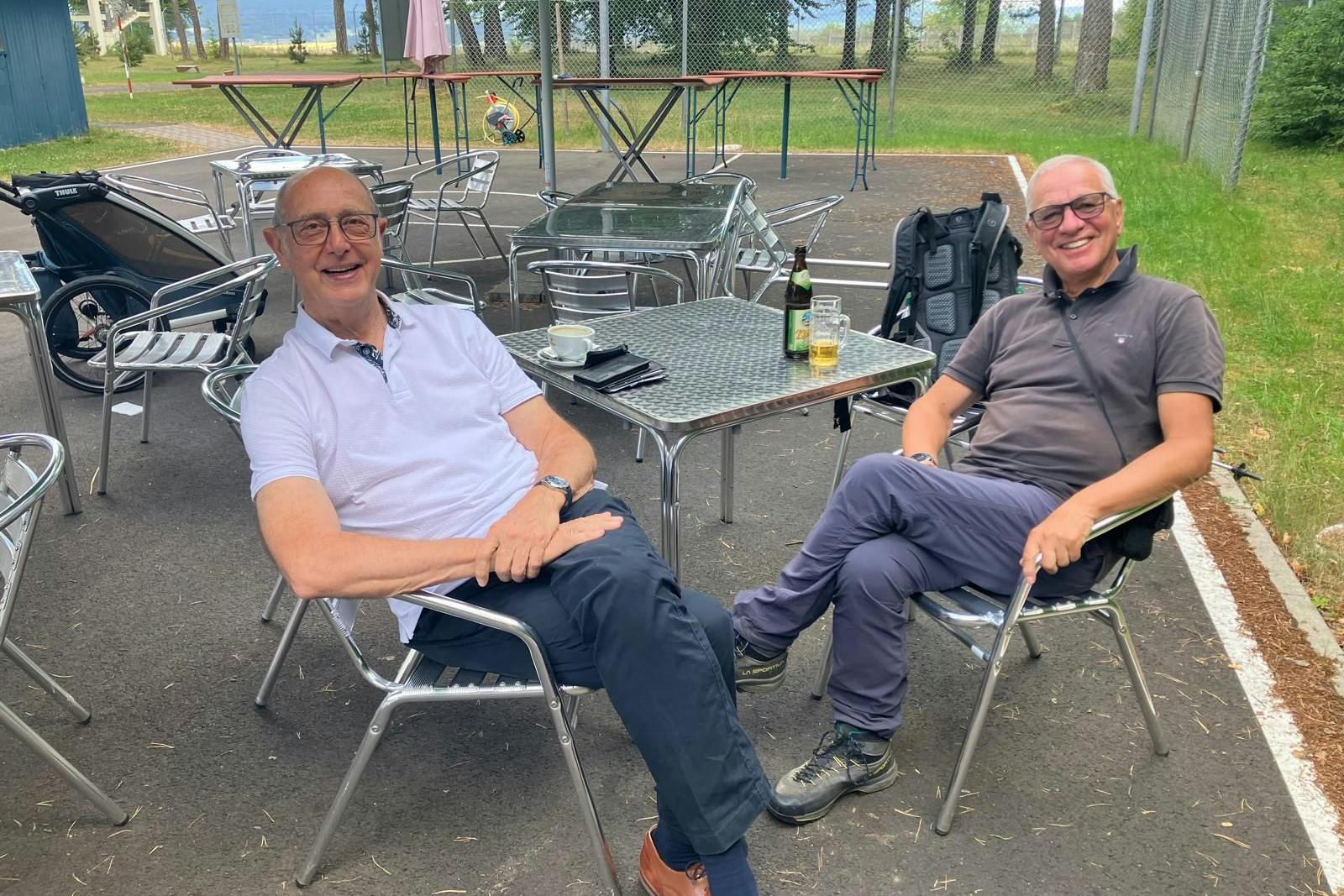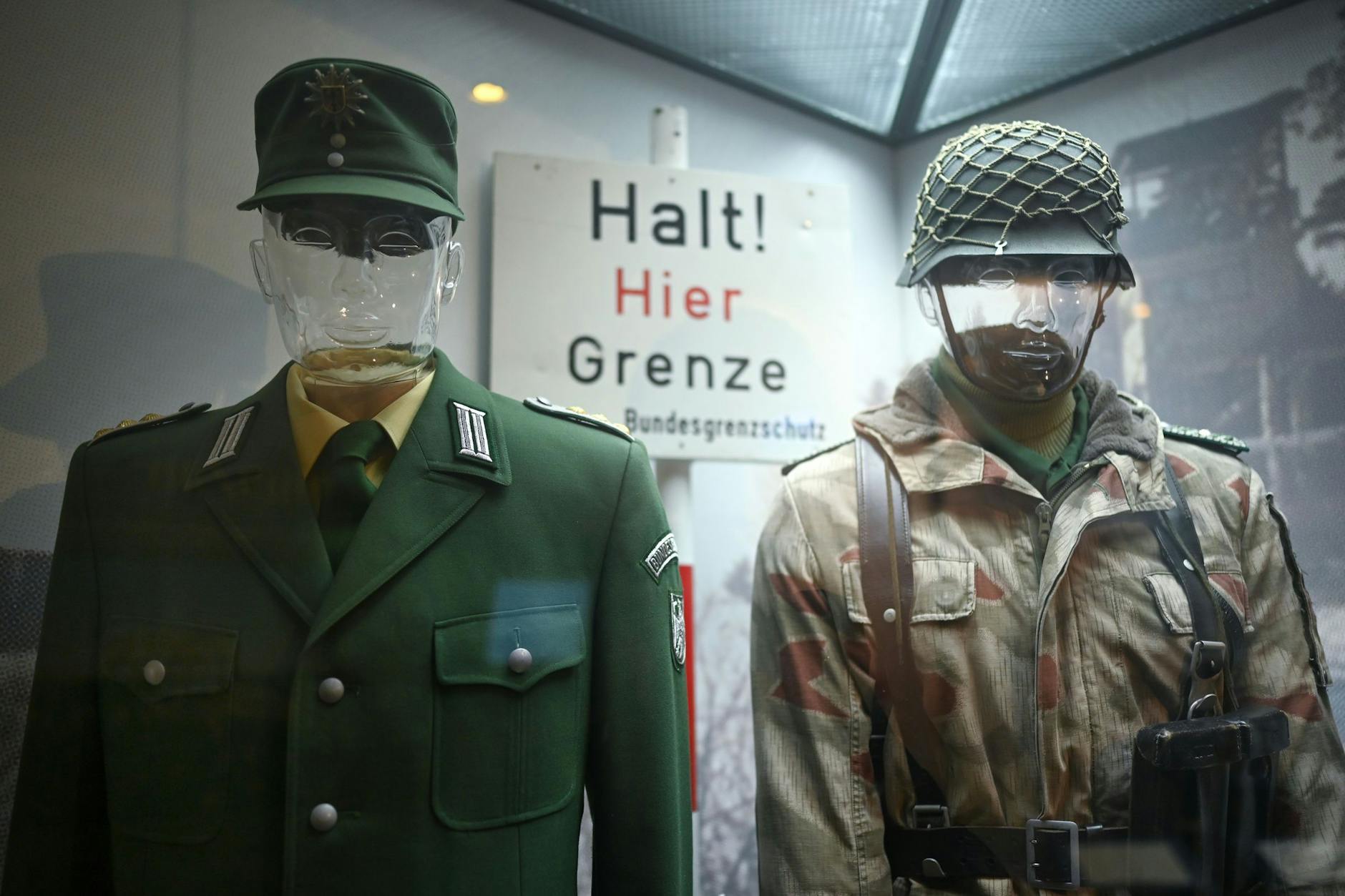Two German lives: What a West refugee and a GDR border soldier have to discuss

What biographies! "Wow" is the kind of comment you get these days. Two men, roughly the same age: he, Günter Polauke, born in 1948, and me, Berthold Dücker, born in 1947, the author of this text. Both born in the SBZ (Soviet Occupation Zone), which became the GDR in 1949. A more accurate description would be: born into the 40-year Cold War , because it had a lasting impact on both of them, the Berliner and the Thuringian – to this day, as their first meeting in the summer of 2025 made clear.
Günter stayed at home his entire life, feeling safe and comfortable in his homeland. Politically, too. Berthold left his homeland at the age of 16, which had always been and still is his "beloved homeland"—he likes to repeat this—but which he no longer considered "his country" at an early age. It had become too confining for him, in many ways. His Christian upbringing and political influence, especially from his father, probably contributed significantly to this.
At some point, he could no longer cope with the two "truths" he had to live by in order to cope and avoid offense: There was the truth he experienced every day, which was reality after all. And on the other hand, there was the state-imposed truth, which had precious little to do with reality. And as a rule, the two "truths" had absolutely nothing to do with each other, so blatantly contradictory as they were. Nothing fit together anymore. Propaganda ("agitprop") and lies dominated the real socialist field.
The 16-year-old crawled through the minefield to freedomThe boy absolutely refused to accept the norm. Then, the desire to become a journalist began to grow within him. This desire was fueled by his highly reviled consumption of Western television. Dictators fear nothing more than the truth. This is still true today.
A free and self-determined journalist in a country without freedom of expression, without a free media? How could that be possible? So in 1964, he crawled through the minefield to where that was possible: to West Germany, a country that was foreign to him in almost every respect. As difficult as the beginning was for him, he never regretted the step.

Günter Polauke's life in Germany was quite different. He, too, was deeply shaped by his upbringing, his very different experiences. Both of them, now well over 75, are now lugging around this bulging, oppressive backpack of experiences. And it's obviously a heavy burden. They rummage through it, trying to bring some order to it, perhaps find something tangible, even clarification. They're looking for answers. For explanations. And for understanding. Above all, for understanding.
What has all come together over the years?
Thirty-five years after German reunification, Günter still gives the impression that he perhaps lived in the "better" part of Germany after all: "It wasn't all bad" and all that. Perhaps "socialism" in the GDR should have been given a (second?) chance back then, at the latest in the late 1980s, when everything began to fall apart. A glimmer of idealization still shines through.
The differences remain clearShame too? Stasi, dictatorship, well. That may all be true. It wasn't particularly exciting either. But aren't those simplistic slogans these days, killer arguments? Günter Polauke's critique of the system is nuanced, which doesn't surprise his interlocutor at the Point Alpha memorial. He knows this, even if it's becoming increasingly difficult for him to understand it, after all this time, after all the tragedies, large and small, that have happened. And are still happening elsewhere! Isn't that crazy? Also the still clearly noticeable proximity to the big brother in the East and its devilish activities today.
Berthold Dücker is much clearer on this. And as a journalist, he strives for the greatest possible objectivity. Assessments in both directions, even harsh judgments, seem to come more easily to him. This is probably because he has experienced both sides, decades longer than Günter, without ever losing his intense love for his Thuringian homeland. He has always remained a Thuringian, even in the West.
It is therefore important to him to repeatedly emphasize that his criticism of the GDR concerns "solely the perfidious SED regime," but never the individual lives of the people in this "first workers' and farmers' state on German soil." Because that might have been "more valuable" than the lives of his compatriots in the West, "because they had to live under difficult conditions."
Günter counters that he, especially as a former border guard, can't necessarily see the fact that "they" had been shooting people like rabbits at the border for decades. And so on. Whether or not the GDR was a "dehumanizing, unjust state" remains a controversial issue to this day (!). Unfortunately, the time for this first meeting wasn't enough to even partially resolve this ultimately important question between the two gentlemen. But all is not lost yet...

Yet both men are remarkably relaxed during this first encounter, as a waitress in the cafeteria at the Point Alpha Memorial noted. "It's as if two good, old friends had met again after a long time." Two witnesses, in fact, witnesses of one and the same time.
Solved is good! Rather detached from their very different pasts, careers, and experiences. But also more open, freer, more frank. To each other, about each other, with each other. They've survived everything. One here, the other there. But together in one Germany. That's why they now seem at peace with themselves and this certainly beautiful, but too often also crazy, world. Progress!
There was a relatively early consensus that, logically, not everything had gone perfectly during the turmoil of 1989/90. It couldn't have gone perfectly! The country had been divided into two very different societies for too long. There was simply no recipe, no historical precedent that could have served as a guide for how to manage "reunification" as smoothly as possible. Dücker quotes a wise line by Bernhard Vogel : "Yes, we in the West had a ministry for all-German issues. But unfortunately, none for all-German answers."
Both gentlemen largely reconciledNevertheless, both men seem largely reconciled today. With themselves, of course. They're also apparently satisfied with the overall result, 35 years later. And when you see the border wanderer, at 76 years old, able to hop carefree back and forth between the once-divided worlds without a single ordered shot being fired, then he's probably happy, too. He conveys that impression 100 percent.
The other one is anyway. How long they've both been that way really doesn't matter anymore. It doesn't matter in the end. The main thing is that they're happy today, the border guard and the refugee, both happy and grateful that they didn't meet back then.
Günter Polauke and Berthold Dücker spontaneously agree on one thing: It's not just they who absolutely must stay in dialogue. The entire, still-divided German homeland must finally start talking to each other (again)! First and foremost, we must reach an understanding that we are by no means only suffering from the consequences of reunification, but rather, primarily, from the consequences of four decades of terrible and unnecessary division.
We must finally admit this to ourselves. Even if it hurts. Didn't we promise each other in 1989/90 that we would tell each other in detail about our very different biographies for the sake of better mutual understanding? For a thousand reasons, both good and bad, this has largely been neglected. Despite all the success we have achieved!
Berthold Dücker was originally scheduled to deliver a speech in Regensburg on the 72nd anniversary of the first popular uprising in the GDR on June 17, 1953. Unfortunately, the event was canceled at short notice. He had planned these closing remarks for his speech:
"Our country is still torn apart, as the depressing election results show us. We must engage in dialogue with one another. Urgently. There is no other solution to finally find inner peace. I appeal to all those in positions of responsibility in the country, in the East as well as the West, in the North as well as the South: Make this essential task a top priority! Cross-border town twinning, for example, and purposefully organized encounters, especially among young people, once helped in divided Germany, and they also brought Europe together. And in doing so, they ensured the longest period of peace on our continent. We have the good examples, the recipes for success, of how it can be done! How it can only be done!"
Gratefully touched. Why?Berthold Dücker feels "gratefully touched" by his encounter with contemporary witness Günter Polauke at Point Alpha, this very, very German memorial. Our young people, in particular, should flock there to understand, in both senses of the word, the horrific things we committed after the twelve-year Nazi dictatorship – for more than 40 years. Right in the heart of Germany. How fortunate that this nightmare is over!
Dücker is touched by gratitude because the encounter took place on a stretch of the once deadly border that is now part of the idyllic and peaceful UNESCO Rhön Biosphere Reserve. And because he met Günter Polauke there, a sensitive, thoughtful, and therefore willing to learn person. Otherwise, as a former border guard, he would hardly be strolling around the formerly dangerous border strip so seemingly carefree, eager to talk to all sorts of people he happens to meet.
Dücker is touched by gratitude, also because he was once again able to meet an open-minded person without blinkers and with wide-open eyes and ears, who loves to talk as much as he loves to listen. A rare quality! He wishes both his conversation partner and himself an insightful journey through the exciting life of the two Germans.
Berliner-zeitung

